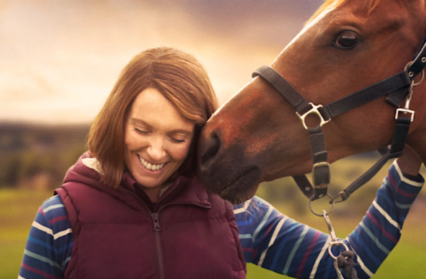Gary Raymond reviews Dream Horse, the story of a community-owned racehorse brought up on an allotment in the South Wales valleys that went on to win the Welsh Grand National.
Has there been a more apposite moment in recent memory for a feel-good movie? Euros Lyn’s Dream Horse, the telling of a true story about a syndicate of common non-horsey folk from Cefn Fforest in the Gwent valleys rearing a prize-winning thoroughbred, is almost nothing other than a feel-good movie. It skates lightly where other films might have – and have – delved deeper, into themes of politics, poverty, and class, but Dream Horse is a rare beast in Welsh cinema, in that it’s a film that knows exactly what it is. Feel-good. Absolutely nothing wrong with that.
Lyn’s movie is fully self-aware and is quite proud to announce it is firmly in the Full Monty/Brassed Off stable – although where those films triumph is in the pairing of social commentary with dry British sentimentality. Lyn is less interested in that – (though not wholly uninterested; there are some very moving moments, such as when Karl Johnsons’ Kerby is budgeting his meagre weekly outgoings into glass jars, one marked “Horse”). Here you won’t find any lingering diatribes about the left behind that you find in those north England working class success stories; the rundown shops and loitering unemployed are for the background. Likewise, you don’t learn much about the horse racing business. Once the decision is made for breeding to commence, we move quite quickly through the processes from conception to racetrack. Indeed, from a distance, the success story itself seems less and less Herculean the more you examine it. The main driver is not, ultimately, gumption or working-class spirit or anything like that, it’s good old hard cash. The cash to buy the mare, the cash to present her to the stud, the cash to hand the subsequent brood over to the “best trainer in the country” in Philip Hobbs, and then the cash to pay for top range medical care when – spoiler! – the horse picks up a knock. Not such a remarkable story when you break it down, no matter how much emphasis is put on the fact that Dream Alliance (as the horse is eventually named) was raised on an allotment.
One suspects Lyn, a good solid dependable director who has good solid dependable credits to his name such as the brilliant Happy Valley, knows very well what he has, and the fact he’s carved out such a winning two hours is to his absolute credit. This isn’t a horse film any more than Brassed Off was a film about a sousaphone, and so the highly competitive and snobbish world of horse racing is just a bit of colour and provides some light comedy where classes clash, the uncouth Welsh spit and sawdust coming up against the silk scarves of Oxford old money. The cast get it too. A lovely cameo from Peter Davidson as toff trainer Lord Avery is one of many.
And yet none of this will stop you from wanting to dance in the street when all eventually comes good for horse and syndicate, singing all the usual Welsh anthems we Welsh sing when we’re dancing in the street.
The performances are what stop this fluttering away on the slightest of breezes. We can forgive Toni Collette’s inconsistent rhythms on her accent, because she’s giving this her all, which is considerable. She is quietly determined as Jan Vokes, the catalyst for the syndicate and protagonist of the movie. Vokes’ story, as told here, is one of emotional investment, the horse meaning so much more to her than simply an expensive hobby. But the story could have come from any number of angles and been just as warm and uplifting. From her husband “Daisy”, played by a wonderfully avuncular Owen Teale, who finds himself searching for a wider purpose in the journey of Dream Alliance. Or from Damian Lewis’s accountant Howard Davies, who threatens his delicate and hard-won home life with his involvement in the syndicate. Bringing up the rear, Steffan Rhodri, Sian Phillips, and the aforementioned Johnson, don’t put a foot wrong.
Dream Horse was originally scheduled to hit cinema screens in March 2020 and was an early filmic casualty of the first lockdown. But it’s benefitted from the wait. It’s not just a feel-good film coming out at a time when people could do with such a vibe, but it’s a perfectly constructed, perfectly told, perfectly weighted feel-good film, which is probably more than we could have hoped for.
Dream Horse is out in cinemas now.



 Enjoyed this article? Support our writers directly by buying them a coffee and clicking this link.
Enjoyed this article? Support our writers directly by buying them a coffee and clicking this link.








